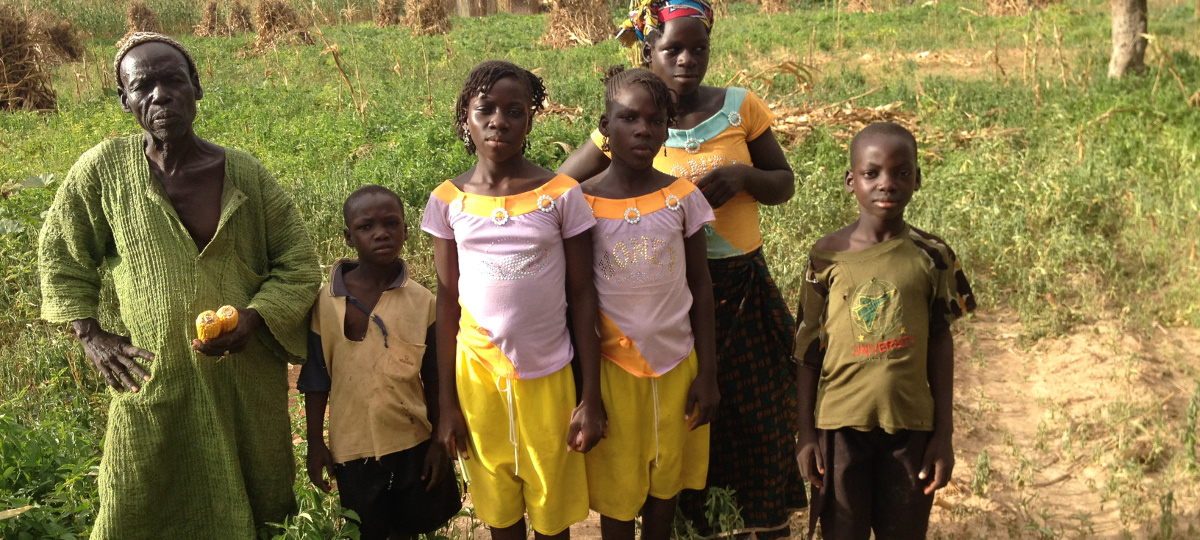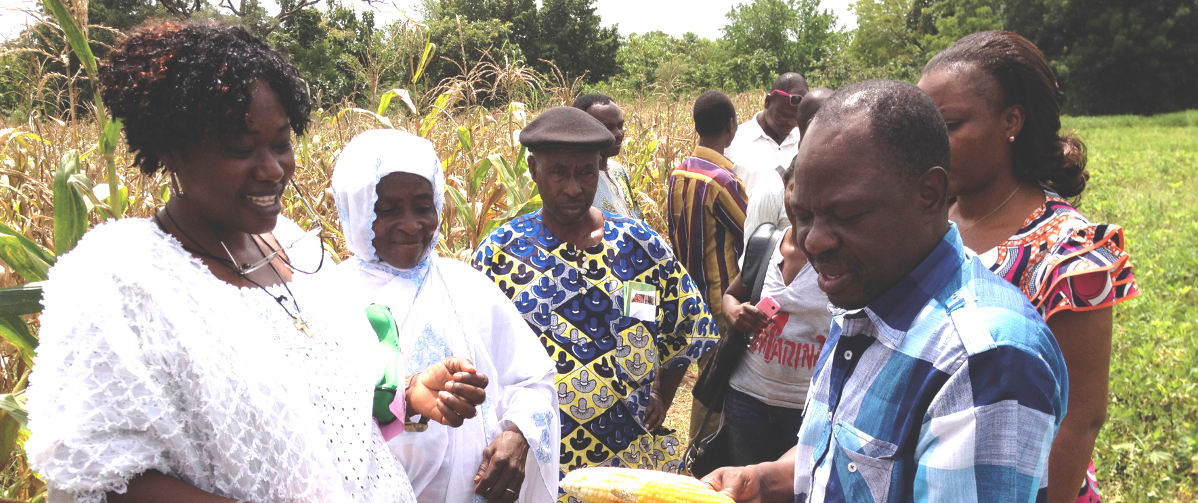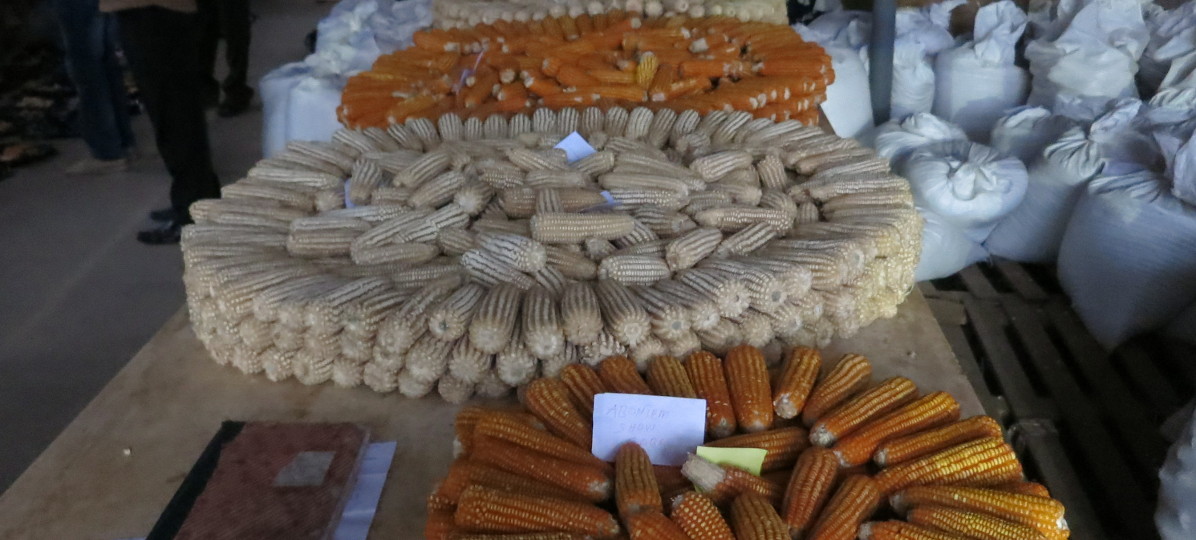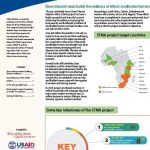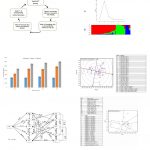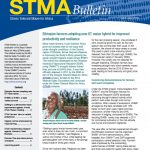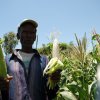- Improved maize benefits children, Koulikoro, Mali
- Creating awareness about drought tolerant maize, Benin
- Newly released maize varieties on dispaly, Crops Research Institute, Kumasi, Ghana
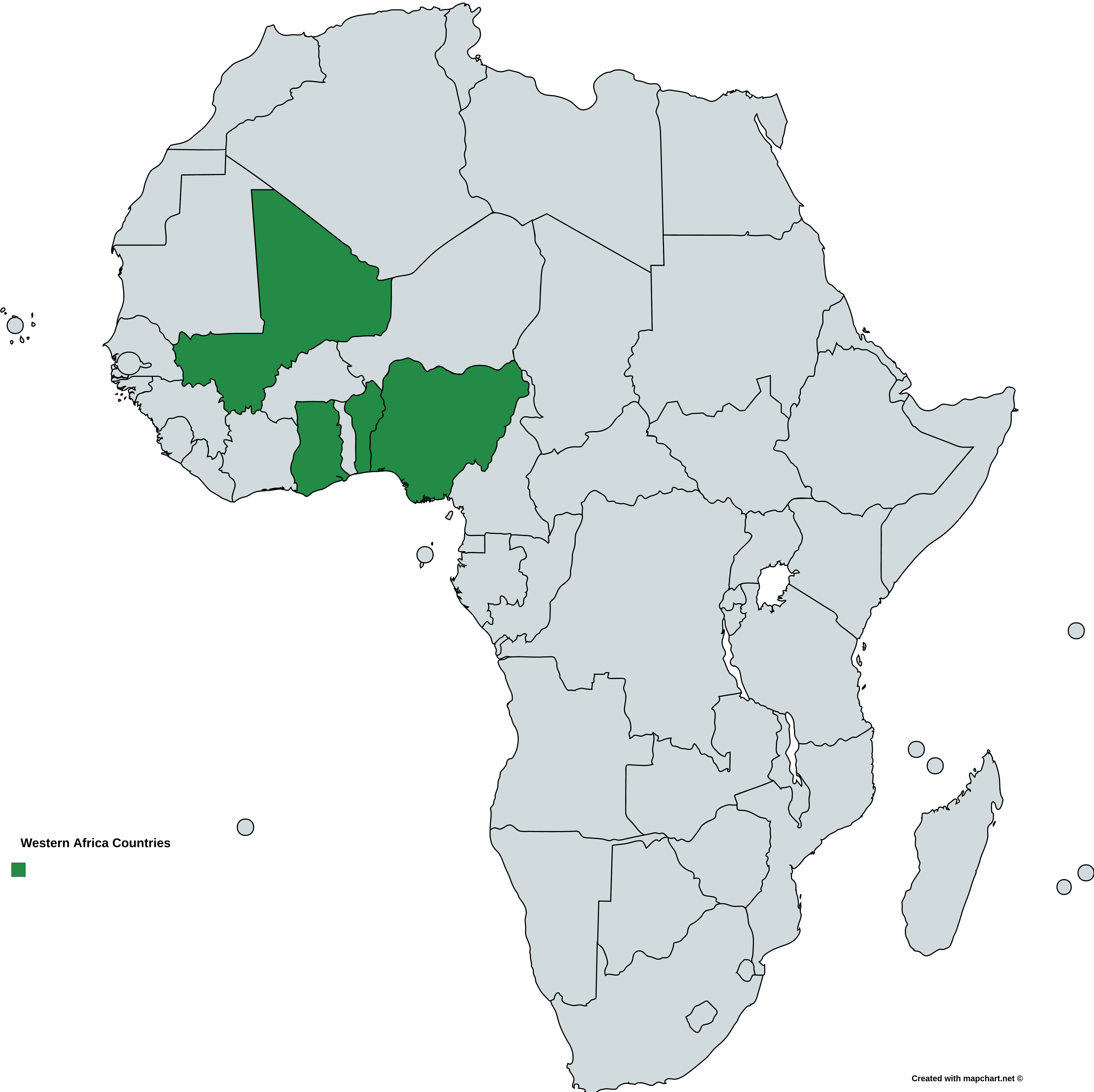
STMA locations in Western Africa (Map click to enlarge)
Maize production in West Africa has experienced significant growth over the years. In addition, maize is becoming increasingly important as a food security crop in the region. Maize accounts for about one-fifth of the calories and protein consumed by households. For countries like Benin, Ghana, Mali and Nigeria, maize is a major source of food and cash for smallholder farmers.
Recurring droughts remain a continuous challenge to its production, hence the introduction and adoption of improved drought tolerant maize varieties have contributed to achieving food security and poverty reduction, as well as enhanced livelihoods. However, to achieve optimum yields from the stress tolerant maize, appropriate and adequate provision of production inputs (such as fertilizers, good quality seeds, and herbicides) are essential.
Other constraints to maize production in West Africa include diseases , high cost of land preparation, lack of adequate storage facilities and access to extension services, inadequate availability of improved seeds and access to inputs. Inconsistent policies across the region have crippled investments to increase productivity.
Women play special role in cultivation of maize, legumes and vegetables on smaller parcels of land as well as in processing and marketing of farm produce to provide additional income to the household.
In West Africa, STMA will cover Benin, Ghana, Mali, and Nigeria with a key priority to strengthen the seed systems to replace old and obsolete varieties and reduce the use of recycled seeds in all the four countries. The International Institute of Tropical Agriculture (IITA) will coordinate STMA activities in this region.
West Africa News
Latest STMA Bulletin is out
Read the latest news from the just concluded Stress Tolerant Maize for Africa (STMA) initiative. This issue highlights the impact the project has had on farmers in sub-Saharan Africa, how it has helped build resilience of Africa’s smallholder farmers and how the improved maize varieties will enable partners to reach farmers on time to plant and produce maize during the COVID-19 crisis in different countries in SSA. You will also get to read about farmers getting an opportunity ...
List of STMA supported publications for sub-Saharan Africa for 2019
Amondo, E., Simtowe, F., Rahut, D.B., Erenstein, O., 2019. Productivity and production risk effects of adopting drought-tolerant maize varieties in Zambia. International Journal of Climate Change Strategies and Management 11, 570-591. https://doi.org/10.1108/IJCCSM-03-2018-0024
Awata, L. A. O., Ifie, B. E., Tongoona, P., Danquah, E., Jumbo, M. B., Gowda, M., Marchelo-D’ragga, P. W., Sitonik, C., & Suresh, L. M. (2019). Maize lethal necrosis and the molecular basis of variability in concentrations of the causal viruses in co-infected maize plant. Journal of General and ...
Street theater amplifies need for stress tolerant maize varieties
The Stress Tolerant Maize in Africa (STMA) project team in Nigeria used street theater to drum up messages on how to mitigate stresses affecting maize production in the country. The messages targeted mainly the youth, informing them that with the right stress-resilient seed varieties and the application of recommended agronomic practices, they can turn farming into a lucrative and livelihood improving enterprise. The messages were developed by the STMA team in collaboration with the Adopted Village Project of the National ...
The list of STMA-supported research publications from West Africa for the year 2019 is out
Melaku Gedil and Abebe Menkir. 2019. An Integrated
Molecular and Conventional Breeding Scheme for Enhancing Genetic Gain in Maize
in Africa. Published in Frontiers. Plant Sciences and accessible here
Adu, G. B., Badu-Apraku, B., Akromah, R.,
Garcia-Oliveira, A. L., Gedil, M., Awuku, F. J. 2019. Genetic diversity and
population structure of early-maturing tropical maize inbred lines using SNP
markers, published in PloS ONE, volume
14, number 4 and accessible here
Badu-Apraku, B., Talabi, A. O., Fakorede, M.,
Fasanmade, Y., Gedil, M., Magorokosho, C., Asiedu, R. 2019. Yield ...
STMA Bulletin April-June 2019
Discover some of the recent maize breeding and seed systems work of the Stress Tolerant Maize for Africa initiative, covering the period April to June 2019. STMA addresses multiple stresses affecting smallholder maize farmers in Africa. Read More
STMA Stakeholders Hold their 2019 Annual Review and Planning for West and Central African Region
West Africa STMA 2019 review meeting held at IITA headquarters in Nigeria, 23-27 April 2019
The 2019 Annual Review and Planning Meeting
for the West and Central African Regional Stakeholders in the STMA Project was
held at the headquarter of International Institute of Tropical Agriculture
(IITA) in Ibadan, Nigeria, from Tuesday 23rd to Saturday 27th April 2019. The
meeting had in attendance members of the STMA maize breeding, testing,
demonstration and promotional teams in Nigeria, Ghana, Benin and Mali.
The meeting had for each country
scientists, promotional experts ...
Meet Hajia, a Nigerian maize woman farmer enthusiast about her collaboration with STMA
“I am Hajia Asibi, a community women
leader, civil servant and a proud farmer. But my story and venture in
agriculture is not a conventional one.
I have not always been a farmer. In fact, I never dreamt of one day
becoming a farmer. In my youthful years, I believed farming was a profession
for the poor, the masses. Perhaps this perception was informed my archaic and
laborious methods of farming by everyone around me. Indeed, all the farmers I
knew then ...
Transforming farmers’ lives with climate and pest resilient seeds in Kaduna State, Nigeria
Mallam Idris Biye from Biye village, Kaduna State in Nigeria explains how being engaged in testing STMA varieties transformed the lives of many families in his village. Credit: IITA
“My name is Mallam Idris Biye, but my
people here call me Yellow Biye, perhaps because I am fair in complexion,
compared to many of my neighbours. I live in Biye Village, Kaduna State,
Nigeria; I farm maize, soybean, sorghum and millet. But my favourite is maize.
Biye has always been an agrarian community
and we ...
Can drought-resilient maize take pressure off African farmers?Is maize an answer to pressure on African farmers through climate change? The Center for Development Research (ZEF) organised a panel of experts to address this topic in Bonn, Germany. Read More
Videos
Publications

